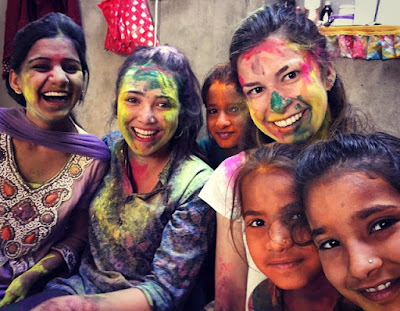India is a wonderful country. The culture is diverse, the food wonderful, and the people amazingly kind. However, India also faces a lot of problems, and the more research you do, the more complex the problem seems. According to Indian law, your husband cannot rape you. Although it its prohibited by law to marry before the age of eighteen, girls get married when they are fourteen years old, and pregnancy will follow soon after. Furthermore, because of selective abortion and malnutrition, India is now missing millions of girls. In a lot of areas a women is still perceived as almost worthless.
How this affects me? Actually, it makes me pretty sad. A foetus that does not even has the chance to be born because of her sex, a women being immolated because of a dowry, these are things that should not be happening. No one deserves to be killed because of something random like gender. And still, it happens daily.
However, it also reminds me every day why I am here, why I am doing this job. Every month, I see how young girls are getting married, and are not always ready for it. A week ago, I was in Gajner for a coordinators retreat. While talking with the nineteen-year old Pooja, the niece of our hosting family, she was telling us that she will marry in a year. Right now, her mother is looking for her future husband. This will be someone of the same caste as Pooja’s. Pooja answered with a firm “No.” when we asked her if she was excited to marry soon. Pooja does not want to leave her family yet, and you could see in her eyes that the thought of it made her upset.
 |
| Sharing moments with girls in Rang Mahal |
In the centre I’m working it, RangMahal, some girls even get married when they are fourteen. Most of the girls are from the most marginalized community in the village, the Naat community. The people within this caste almost all have not received education, are illiterate, and live from begging. Although I have not researched this yet, I would not be surprised if these girls don’t know how sex works. How to have safe sex, how birth prevention works, or how to say no to sex and realize that you are the boss of your own body. ‘Sixteen and pregnant’ could scout a lot of girls here.
However, there are also girls that cannot wait to be married. For example, a couple of days I was watching a cricket game on the television with a family living in RangMahal. All of a sudden, a girl pops up on the screen, holding a huge sign that says “I’m finally eighteen, marry me!”
But no matter how you look at it, a thing is clear: marriage is really important. After this, the main task for women is to get children –preferably boys– and take care of the household. Energic, enthusiastic girls slowly transform into shy women, hidden behind a sari.
Fortunately, I see examples within this village of women that have empowered themselves. Nila runs her own shop at the back of her house. She sells fabrics in all colours you can think of, and if you give her your measurements, she will make a perfectly suiting kurta for you. It is clear she is also highly respected by the men, and I rarely see her faced covered by her sari. Or Rika and her friends that run twice every day, and are involved in competition in- and outside Rajasthan. Although this may seems like something small, compared to other women in India this is already a huge accomplishment.
 |
| Celebrating Holi with the girls in Rang Mahal |
What also fascinates me, is how I as a western women can enjoy privileges regarding my behaviour towards men. I am allowed to shake hands with men, or join parts of the wedding that are normally only allow male participation. Why can Indian women not do this, what makes me different from them?
In the upcoming months, I hope to create some foundations to make women aware of the rights they have. That they have the right to say what they like and dislike, to become more independent, have a bigger saying in their lives. Shortly, to become leaders of their own life.
Iris Workum - The Netherlands
Project Manager Women's Empowerment and Health

No comments:
Post a Comment